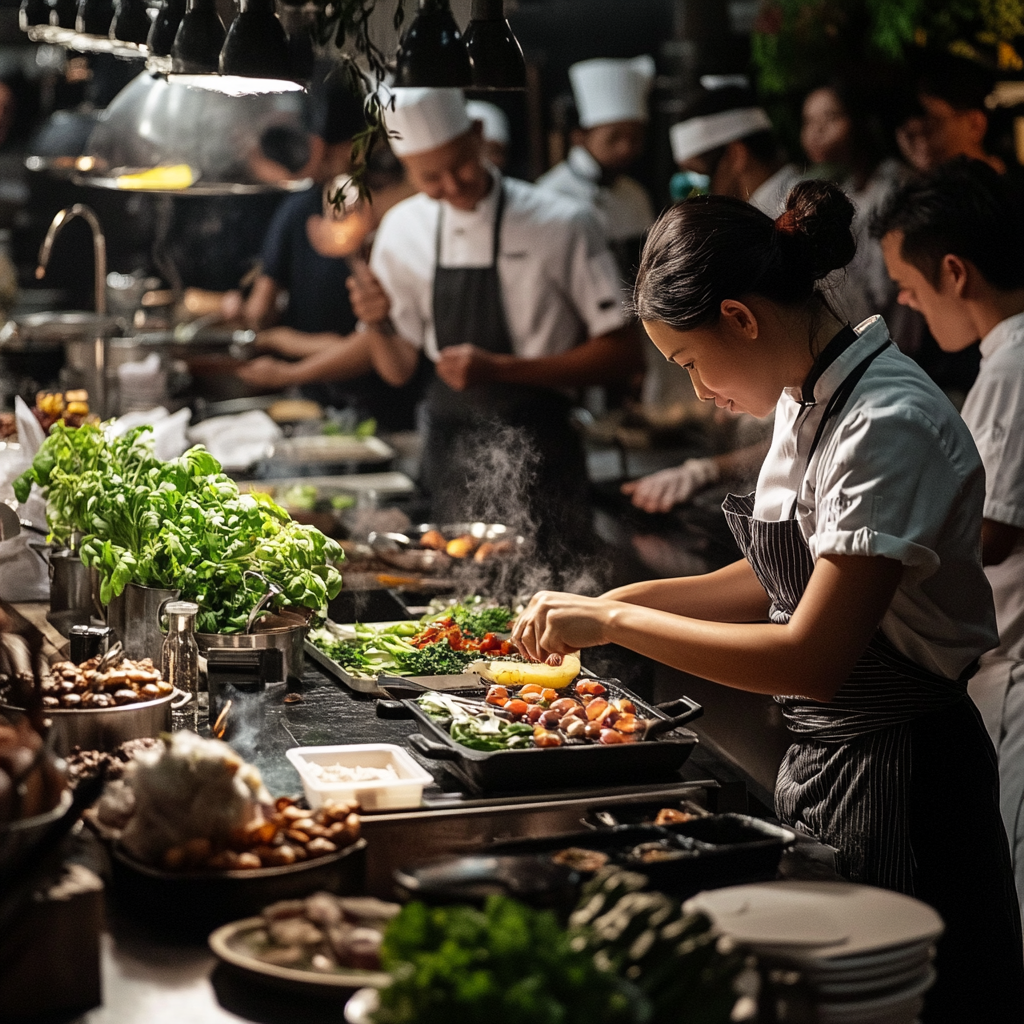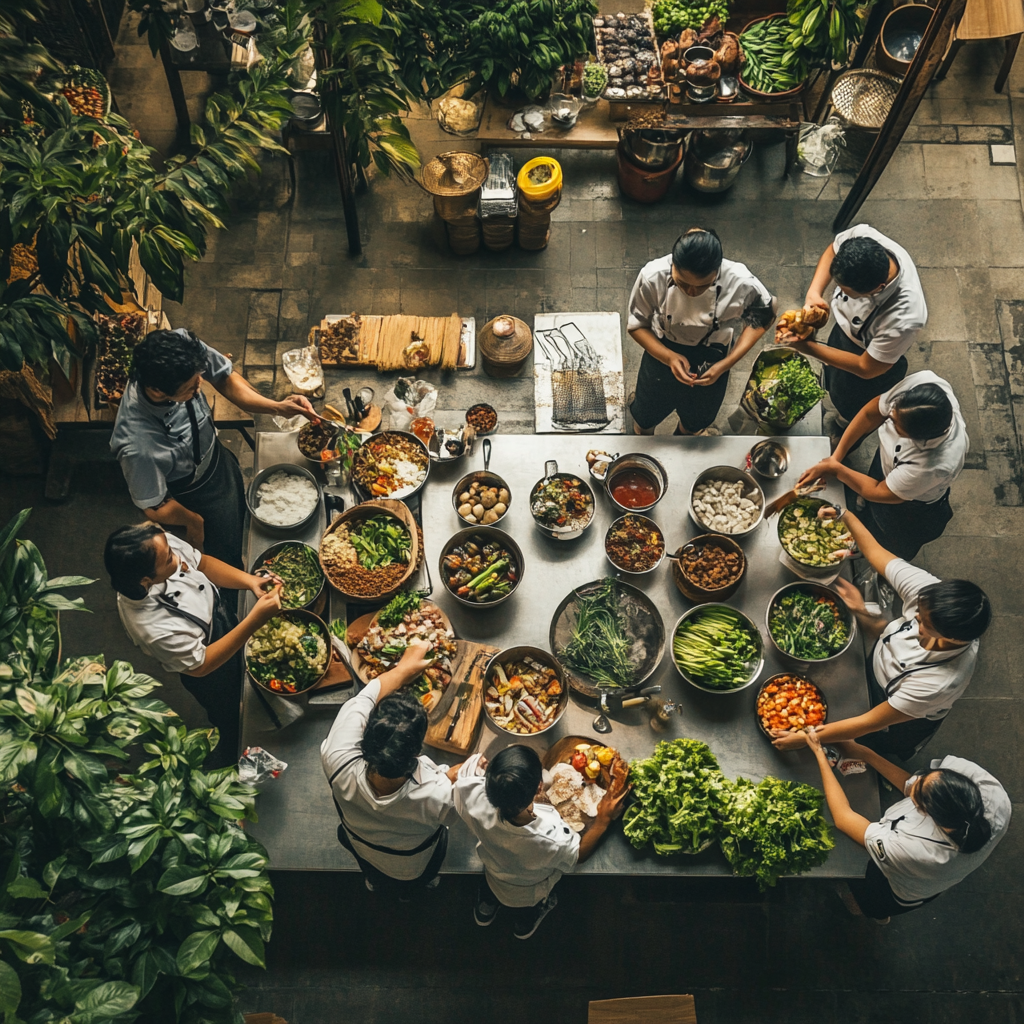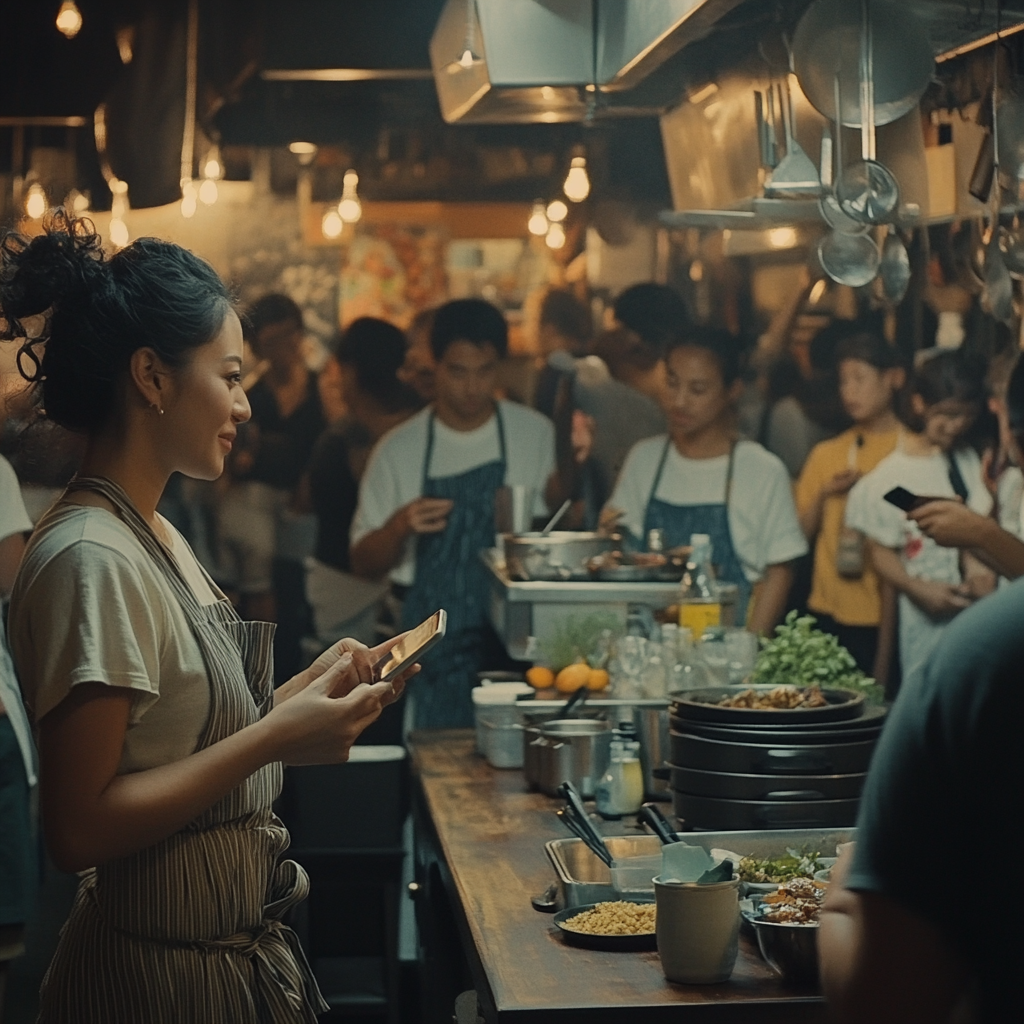1.2 Team Culture and Values
1.2 Team Culture and Values

Core Values
Empathy and Respect
Story: Imagine working in the kitchen, and a teammate accidentally spills a tray of soup. Instead of getting upset, you offer a hand and say, “It’s okay, let’s clean it up together.” That small moment of kindness can make a big difference, helping the team feel supported and motivated.
Example: A guest asks for their dish to be less spicy, but they seem unsure. You smile and ask, “How spicy would you like it? Just a little or none at all?” By listening and adjusting, you show care and make their experience special.
Teamwork
Story: Picture a busy service where one station is struggling to keep up. Instead of watching from the sidelines, you step in to help, saying, “I’ll take care of this part while you catch up.” Working together like this keeps everything running smoothly and shows that the team has each other’s back.
Example: If someone is new or struggling with a task, like chopping vegetables or plating a dish, you can share a tip or lend a hand. Teaching and supporting one another makes the whole team stronger and more confident.

Caring for the Planet
Story: One day, you notice that food scraps are being thrown away. Instead of wasting them, you suggest using the scraps for vegetable stock or composting them for a garden. This small change helps reduce waste and creates something valuable for the kitchen.
Example: After the shift, you notice the lights in the kitchen are still on. Turning them off and reminding others to save energy may seem small, but it makes a big difference in protecting the environment over time.
Keep Growing
Story: Imagine trying to make a new dish for the first time, and it doesn’t turn out quite right. Instead of giving up, you think about what went wrong and give it another shot. Maybe the seasoning needs adjusting or the cooking time needs tweaking. Every attempt teaches something new, and soon you’ve mastered it.
Example: When learning a new skill or technique, like grilling fish kebabs or perfecting a dessert, don’t be afraid to ask for help or experiment. Each try makes you better, and every success builds your confidence.
Be Honest and Open
Story: In an open kitchen where guests can see everything, honesty matters. If an ingredient is accidentally dropped, don’t hide it. Throw it away and start fresh. Guests notice these actions, and it shows that the food is prepared with care and integrity.
Example: During a team meeting, if there’s an issue, like a menu item that’s unclear or not working, speak up and offer a suggestion. Open communication helps solve problems and shows that everyone is committed to doing their best.
Expected Behavior in the Workplace

Punctuality and Preparation
Story: Imagine arriving a little early for your shift. This gives you time to organize your station, check your tools, and make sure everything is ready. When the first order comes in, you’re already prepared, and the shift starts smoothly.
Example: Always wear a clean and complete uniform, including your apron and hairnet. This not only looks professional but also meets hygiene standards, showing respect for both your team and guests.
Calm and Focused Presence
Story: During a busy lunch service, the orders are coming in fast. Instead of panicking, you take a deep breath and focus on one task at a time. Staying calm helps you avoid mistakes and keeps the team working efficiently.
Example: Avoid using your phone or chatting in guest areas. Instead, focus on the tasks at hand. Guests notice when you’re engaged, and it leaves a great impression.
Accountability
Story: One day, you accidentally over-salt a soup. Instead of hiding the mistake, you tell your supervisor and work quickly to make a fresh batch. Owning up shows responsibility and helps the team trust you.
Example: If you promise to prepare a station or complete a task, make sure it’s done on time. If something is preventing you from finishing, ask for help rather than leaving it incomplete.
Team Spirit
Story: A teammate is struggling to keep up during a busy dinner rush. You step in and say, “Let me help with plating while you handle the grill.” Working together keeps the orders moving and lightens the load.
Example: When the team finishes a great service, take a moment to acknowledge everyone’s efforts. Saying, “Great job today, everyone!” helps build a supportive and positive work environment.
Cultivating a Guest-First Mindset

(Make every guest feel special)
Commitment to Service Excellence
Make every plate perfect, because it’s not just food—it’s an experience.
Guests notice everything, so keep your station clean and professional.
Proactive Problem-Solving
If a guest has an issue (like an allergy or a missing dish), handle it quickly and calmly.
Don’t be afraid to involve a supervisor if you need help.
Advocating for Plant-Based Living
Know your menu and why plant-based food is awesome. Guests love to hear the story behind their meal.
How We Reflect GWF’s Values (Walk the talk)
In Our Work:
Everything you do—prepping, cooking, cleaning—should be done with care and efficiency.
Always think about sustainability, like using all parts of an ingredient to reduce waste.
In Our Interactions
Speak kindly and respectfully to everyone. Positive vibes make a great workplace.
Communicate clearly—whether it’s a guest question or a team update.

In Our Impact
Show that being eco-friendly isn’t just a concept—it’s part of everything we do, from energy use to how we plate dishes.
Cultural Practices Unique to GWF (What makes us special)
Mindfulness in the Kitchen
Before every shift, take a moment to breathe and set your intentions. It helps you stay focused and positive.
Kaizen Philosophy:
This means “continuous improvement.” Always look for small ways to make the kitchen better, like organizing your tools or speeding up a process.
Empowerment through Training:
GWF encourages you to learn new skills, like advanced cooking techniques or even leadership training. When you grow, the whole team benefits.
Why This Matters to You as a Chef
By living these values, you’ll become more than just a cook—you’ll be:
A Leader: Someone your team can look up to.
An Innovator: Always improving and thinking of new ideas.
A Role Model: Showing others how to work sustainably and with respect.
A Guest Favorite: Making food and experiences that people love and remember.
So, in the kitchen, every action you take is like seasoning a dish—it all adds up to something amazing for the team, the guests, and the planet! Ready to make it happen? 🍴🌍✨
There are no comments for now.